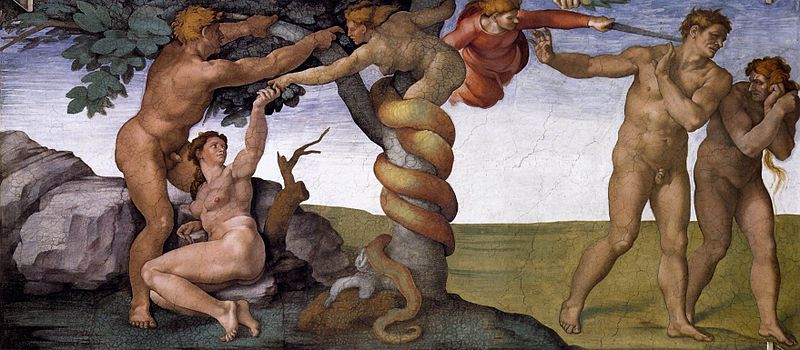Gn 2:7-9; 3:1-7
Ps 51:3-4, 5-6, 12-13, 17
Rom 5:12-19
Mt 4:1-11
Who among us hasn’t had a moment of sudden realization and great regret? In today’s first reading, the story of the fall of humanity provides what is perhaps the quintessential “Good Lord, what have I done?!?” moment. Immediately after Adam and Eve decide to eat the forbidden fruit, “the eyes of both of them were opened.” Suddenly, they could see their mistake and they realized that they had lost their place in paradise.
This story reminds us that somehow it is always much easier to recognize mistakes after they occur. But perhaps more importantly, it reminds us that our downfall can sneak up on us. That which is morally dangerous often appears disguised as something attractive or even innocent. One could go so far as to say that Adam and Eve were seeking something good. They do not commit a heinous crime. They are not tempted by murder or violence. They are drawn by a desire for knowledge. They are tempted by something “good for food” and “pleasing to the eyes, and desirable for gaining wisdom.” Where is the harm?
At the simplest of levels, of course, we could say that Adam and Eve do wrong by disobeying God’s command not to eat or even touch this particular fruit. But God does not issue arbitrary commands, so there must be something more to that prohibition. This story must be telling us more than “obey God’s commands.” What exactly is the nature of their sin? I would like to suggest two possibilities.
In his book A Daring Promise, Richard Gaillardetz dwells at length on this passage of scripture, asking in particular how we are to understand this line: “and they realized that they were naked.” After they eat of the fruit, Adam and Eve seek to escape their nakedness. Gaillardetz suggests that nakedness is symbolic of vulnerability. Before the fall, Adam and Eve were at peace with vulnerability. They accepted the vulnerability of being totally dependent upon God. They were at peace with being physically open and vulnerable. After they have fallen, Adam and Eve refuse to be vulnerable. Thus Gaillardetz believes that the story is suggesting that our refusal to be vulnerable and our desire to be utterly autonomous and independent are manifestations of sinfulness. A call to conversion includes a call to be vulnerable – to open ourselves up to each other and to recognize our interdependence. We might ask “where is the harm” in our efforts to be invulnerable. What is so bad about trying to protect ourselves from being hurt? But if it is true that God calls us to love, then we are also called to vulnerability. You cannot be in a loving relationship without allowing yourself to be vulnerable. To love is to risk.
A second way of looking at the sin of Adam and Eve is to see it as a desire for power. The serpent tells them that if they eat the forbidden fruit they “will be like gods.” Notice the contrast between the desire of Adam and Eve to be like gods – to become more powerful – and the actions of Jesus in this Sunday’s gospel reading. “The devil” tries repeatedly to tempt Jesus to leave behind finitude and the limitations imposed by his humanity and use power befitting the Son of God by making bread out of stone and so on, but Jesus refuses. Here again, the temptations are not to what might be easily recognized as “evil” (violence, blasphemy, etc.). What could be wrong with transforming stones into food when you are hungry and just fasted for forty days? Is amassing the wealth and power of the kingdoms of the world wrong if you have benevolent intentions?
Gilbert Meilaender helpfully directs our attention to Dante’s Divine Comedy to help us think through these matters. In “The Search for Wisdom and the Character of Human Life,” Meilaender recounts Dante’s encounter with Ulysses (Odysseus) in which the latter tells of his final voyage. Having returned from the Trojan wars, Ulysses nevertheless failed to find contentment in an ordinary domestic life (“No tenderness for my son, nor piety to my old father, nor the wedded love that should have comforted Penelope could conquer in me the restless itch to rove and rummage through the world exploring it”). So he ventures off again sailing to the edge of the inhabited world and even then pushing onward until he finally goes a bit too far and his ship is lost at sea. Meilaender explains that Ulysses erred in his failure to recognize the limits of his ability and in his failure to come to terms with finitude. Like Adam and Eve he sought instead to be like the gods. Meilaender concludes: “The goods of life compete with each other, and if we do evil it may be done with great dignity and appeal — done even in the service of some good.” Evil is often “pleasing to the eyes, and desirable for gaining great wisdom.” We must be on our guard against a tendency to do great harm or evil in the name of accomplishing a great good.
Lent is a time when we are called to remember that we are dust; we are finite; we are creatures. We are called to remember that we are sinners and to repent – to stamp out that which draws us away from God and into sin. But we must do so with hope. As Paul reminds us in his letter to the Romans this week, even the gravest of sins is dwarfed by the great mercy of God. Even an act so grave that it brought death itself into the world is overwhelmed by the abundance of God’s grace and mercy.
This Lent, let us endeavor to turn away from sin and to become more Christ-like. But let us not be overcome by our regrets and our mistakes and our failures. “For if by the transgression of the one, the many died, how much more did the grace of God and the gracious gift o the one man Jesus Christ overflow for the many.”




Chris,
Thanks for this post. There is much I could say, but I am most drawn to your suggestion that in order to love one must be vulnerable. I understand this intellectually, but I struggle- on a daily basis- to live this out in practical terms.
I grew up hearing as a child that Lent is about giving something up so I did the usual as a kid- no chocolate, no cookies, etc. Boring and not inspiring.
Fast forward to today- Ash Wednesday- and your post is making me stop and ask myself, what would it mean for me to practice vulnerability this Lenten season? I need to ask myself this more, in so many areas of my life. Your mention of this incredibly important concept (vulnerability) needs more of my attention.I keep getting signs I need to do this- thanks for nudging me in the right direction.
Kari-Shane